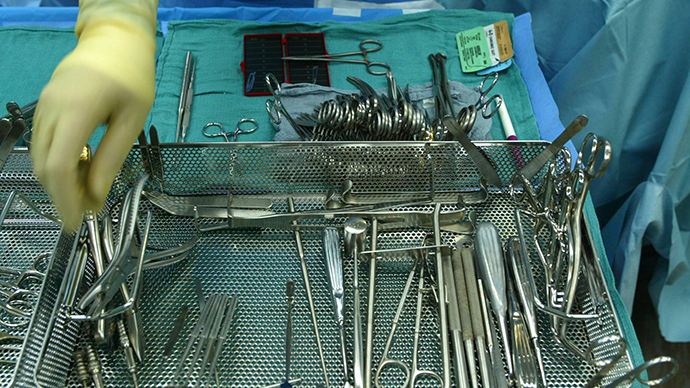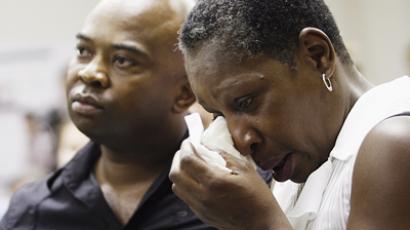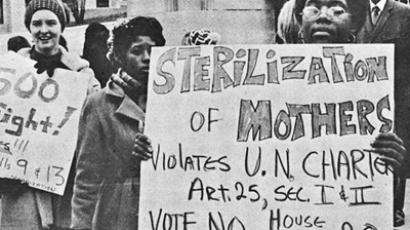Virginia’s forced sterilization victims each to get $25k restitution payments for eugenics program

Virginia is set to become the second state to compensate the victims of its eugenics program ‒ people whom the state deemed mentally or physically unfit to procreate and were then forcibly sterilized without their knowledge or consent.
The commonwealth will give $25,000 each “to individuals who were involuntarily sterilized pursuant to the Virginia Eugenical Sterilization Act and who were living as of February 1, 2015,” according to Virginia’s revised 2014-2016 budget that was passed by the General Assembly at the end of February. A total of $400,000 was set aside for forced sterilization victims, the Virginia Gazette reported.
“$25,000. If I can get that, I’d be pretty happy,” one of Virignia’s confirmed victims, Lewis Reynolds, told RT. “But I would have liked to have got the same amount they got in North Carolina ‒ $50,000.”
Reynolds was an unknowing victim of Virginia’s eugenics program at age 13 after he was hit in the head with a rock and falsely diagnosed with epilepsy as a young boy ‒ he only discovered he had been sterilized after he and his wife were unable to have children.
“I would have loved to have had a family and children and grandchildren, too. And I wonder sometimes what would I be like, a father to my children if I could have any, and play with ‘em and everything,” Reynolds said. “We tried to start a family, but [my wife] told me that if she couldn’t have her own children, she didn’t want any.”
The first forced sterilization program began in Indiana in 1907, and other states quickly followed suit. The commonwealth of Virginia began its eugenics plan in 1924, which affected more than 7,000 people ‒ and possibly over 8,300 ‒ before it ended in 1979.
With an 8-1 vote in its 1924 Buck v. Bell ruling, the Supreme Court gave states ‒ specifically Virginia, where the case was filed ‒ the constitutional authority under their police powers to implement their eugenics programs.
"Three generations of imbeciles are enough," Justice Oliver Wendell Holmes famously wrote the decision, supporting the argument that the state’s interest in lowering the number of people who “already sap the strength of the State” outweighed the rights of proposed sterilization victims to control their own bodies.
“It is better for all the world, if instead of waiting to execute degenerate offspring for crime, or to let them starve for their imbecility, society can prevent those who are manifestly unfit from continuing their kind,” Holmes also wrote in the decision.
Until the late 1970s, 33 states had forced sterilization programs, affecting at least 60,000 people.
“The language that the legislators and bureaucrats developed was very broad. Words were promiscuous, propensity to alcoholism, socially inadequate, defective, unfit. These were very broad terms with, really, just broad meaning, and it was left to social workers and people in the communities to turn in these people [to the states],” Christian Law Institute CEO Mark Bold told RT.
“Often the commonality was that they were poor, sometimes they engaged in minor criminal or trivial behavior ‒ skipped school and things like that ‒ and that caught the attention of social workers, police officers and others, and they would commit them to these institutions,” he continued. “Based upon that, they would first segregate them from the general population, and then ultimately sterilize them.”
The Christian Law Institute’s Justice for Sterilization Victims Project has led the fight for restitution for those who were forcefully sterilized. Virginia is the second state to compensate its victims. In 2013, North Carolina created a $10 million compensation package to be distributed among living victims, who are to receive $50,000 each.
READ MORE: North Carolina agrees to compensate sterilization victims for 45-year eugenics program
“I appreciate, I recognize what Bold [is] doing and recognize what they’re gon’ give me, and I thank them very much for what they’re doing,” Reynolds said.
Bold’s company is still looking for other living victims of Virginia's program to come forward, including at least two people who were sterilized in 1979, as the window for reparations will close in 2019. California is the next state where the Christian Law Institute will focus on gaining compensation for forced sterilization victims. The advanced program on the West Coast served as the blueprint for Nazi Germany’s quest to create its “master race,” Bold said. The state sterilized 20,000 people from 1909 to 1963, more than twice as many people as Virginia did during that time.
"It's one of the most horrific and shameful chapters in California's history," Los Angeles civil rights attorney Areva Martin told CNN.
In 2002, Virginia’s then-Gov. Mark Warner and North Carolina’s then-Gov. Mike Easley apologized to their states’ eugenics victims. Then-Gov. Gray Davis followed suit in California in 2003.















